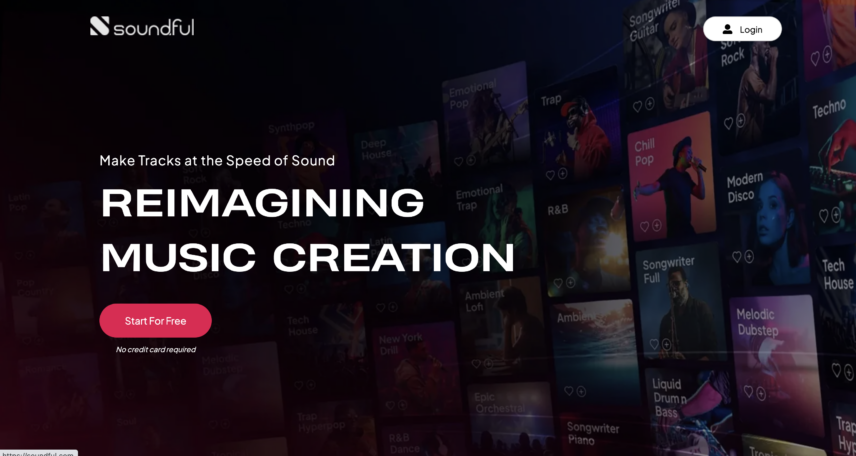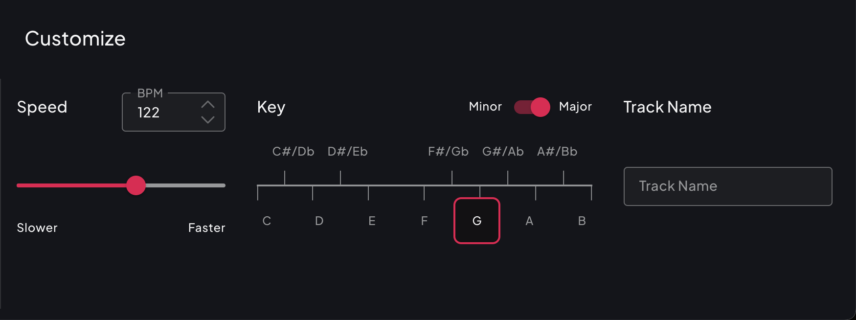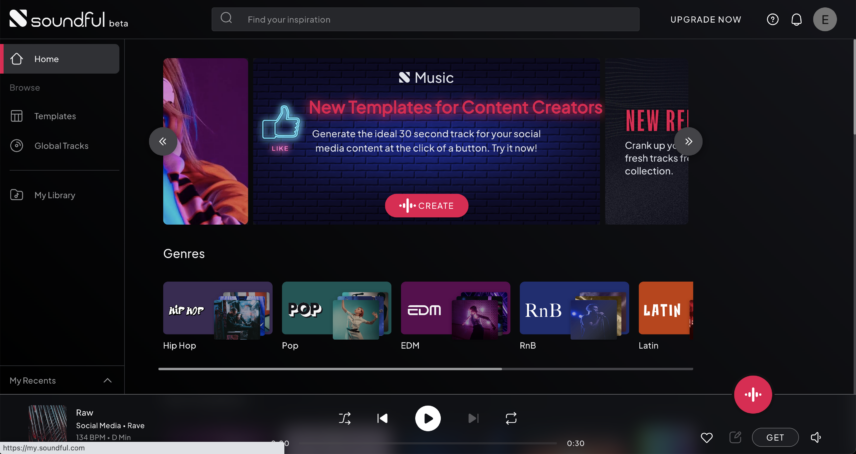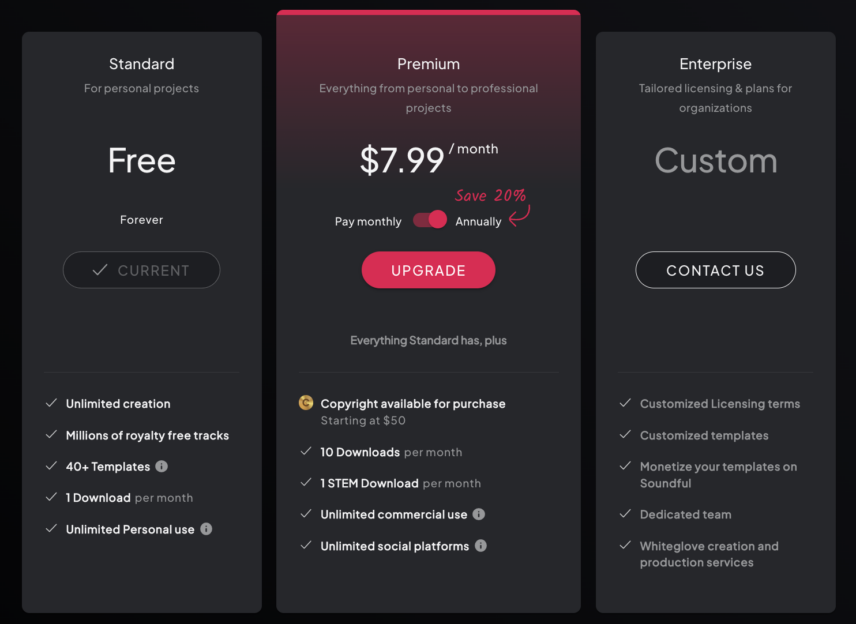Can Soundful, a human aided AI music platform, fulfil the demand for music within the creator community?
Music production, as defined by bedroom computer-generated music, is barely 40 years old. The number of producers has exploded in the past two decades in particular as the barrier to entry reduced. Simultaneously the rise of social media, and with it, the content creator economy, has fuelled a need for music to use in online videos. This has helped to grow the revenue for production catalogues (or music libraries) as well as commercial labels.
For the three major labels, despite some challenging years, they have come through the changing marketplace to outperform the heady days of CD sales. Musicians, often struggling to enjoy the fruits of the streaming sector, will often make library music a viable source of income. And with increased demand, it’s arguable things have never been so good.
However, is that all about to change? A new company, Soundful, has unveiled their beta product of ‘human-assisted AI’ music which is both remarkable and terrifying. It’s remarkable in that the level of quality, at least from a fidelity perspective is indistinguishable from any catalogue online. It’s terrifying that if a platform like this can do all the work for you, it follows to be curious what, if anything, does a musician offer?
When we spoke with technology fiend and techno hero Richie Hawtin last year, one of the most interesting takeaways was his suggestion that AI is not a threat but an opportunity. Explaining his AI interest from the framework of his new company Endel: “the music I make at the moment has a lot of randomization and generative LFO’s making things happen. This is an extension of that, allowing the final decisions to be made by the AI. I knew what textures and modulations I could bake into the samples. I had to know exactly where I could give up control.” Soundful’s proposition is different to Endel. They do however both cede decisions to AI and this often makes musicians uncomfortable.
Yet, AI is hardly new. It’s used extensively in multiple plugins already. Soundful is taking the same concept to a different level. It feels like Scaler and Captain Chords combined with the very best producers and sounds. Having raised the best part of $4 million, evidently, it’s not just an internal vision the future is an automated one. Will musicians accept making music by pressing a few buttons or will the content creator economy drive new revenue streams for musicians?
We sat with Soundful founder Diaa El All to better grasp who their target audience is, which hole they are looking to plug and how they hope to support musicians in this rapidly changing AI landscape. For the nascent producer’s sector, is it unfair to view Soundful as a threat? Will AI replace musicians in the long run?
Attack: Can you tell us a bit about your background?
Diaa El All: I am a classically trained pianist as well as a producer. I was a touring artist and a DJ and I also worked as a ghost producer with a lot of established artists from back in the day.
What Soundful is offering is both remarkable and terrifying in equal measure. I’ve seen some negative comments on a video on your YouTube channel. How do you respond to that?
Sure. The way I see it is there are always going to be people that are unhappy with technology development. Think about when the 808 came out. There were people who were completely against it. They were like “you’re cheating”. Eventually, they started adapting to it.
Another analogy is when Blockchain first came to prominence. People would say: “Oh, my God, this is a bubble, this is crazy, this is bad”. But look where we are today.
When you’re disrupting a specific industry, there’s always going to be pushback. But I don’t look at it like we’re disruptors. We’re democratising music for the creator economy. That’s the most important part.

I believe that the creator market is roughly 2 billion creators. In your view, you’re not necessarily putting musicians out of a job because they’re not necessarily fulfilling that service themselves anyway. Would that be a fair assessment of your position?
Exactly.
If you think about it there are a tonne of plugins using AI learning. There are plugins from iZotope, Native Instruments and Waves just to name a few. The question, therefore, is: “why is it okay to use machine learning in some instances and not others?”. I don’t think that’s fair.
Soundful is not going to take anything anyway from a good producer. A good musician or producer can leverage new tools, like ours, in any way they see fit. And with that opportunity, we will be creating new and interesting roles in the music industry in particular for sound designers and producers.
It’s just an evolution of the marketplace. After all, it’s been built by producers from the ground up!
I don't look at it like we're disruptors. We're democratising music for the creator economy. That's the most important part
So you think a producer would come and use Soundful? Surely it’s far better suited for content creators?
Sure. 70% of the users on the platform are producers, singer-songwriters and rappers right now.
Quite surprising. I was watching one of the videos with Kennedi and how they used Soundful...
Yea, we’ve heard early from emerging artists that Soundful can help with accelerating projects…so we partnered with a series of different artists like Kennedi to do just that. We got a producer to jump in the studio with her and they created the track on Soundful and exported the full stem files, MIDI and WAV. Plus they got it done in one day!
Stems created by Soundful? Does that not open up a copyright nightmare? Full tracks could end up entirely made with Soundful stems or the stems could be blended with other non Soundful stems. How’s that going to work out with royalties, copyright and other legal matters?
Music piracy is music piracy. There will always be bad actors and we are doing some things in the future to help combat that, stay tuned. But with that, said the way we approach it right now, with the subscription, you get to download royalty-free music. You are able to use it for personal use and for ad campaigns etc. Or you can buy 100% of the copyright, mastering, and publishing for a low cost starting at $50. From there it’s all yours and you’re able to do whatever you want to do with it.
That’s quite similar to Tracklib pricing, Beatstars or Airbit?
Sort of. The majority of these types of platforms grant a license where you can release it and use it to garner ‘X’ amount of streams before having to repay. That’s not an approach for us or our consumer. We believe in empowering our users to own the music rather than licensing. With Soundful, you can own the track, which guarantees to avoid legal headaches later in your creative journey.
‘Type beat’ contracts are full of holes. I have concerns there are going to be some copyright minefields ahead of you. What’s to stop someone from making 1000 iterations of a song, downloading them onto their hardware, and trying to build a catalogue, beat the system etc?
We aren’t a ‘type beats’ marketplace. We intentionally don’t play in that space. If anything, we are working to provide artists an opportunity for them to bottle their sounds in a new way that they can monetize and provide inspiration to their fans and other music producers that seek that inspiration. That being said, there will always be bad players. We do have checks and balances on the platform. Don’t forget every sound/sample is fingerprinted for example. The way we lock the metadata into the back end after a user saves a track means it can never be replicated.
We’re changing things and fast. With our subscription model, we’re allowing unlimited creation and unlimited downloads of royalty-free music for our paid subscribers starting at $7.99 a month.
The technology is impressive but with the creator options available right, how different can each version the system make truly be? Changing key or BPM will produce a lot of tracks that are not the same but certainly similar. If two similar-esque tracks blow up, will creators sue one another in a ‘Blurred Lines’ type scenario?
This is part of the reason that we’ve approached solving the problem through “human aided AI.” It isn’t enough to just let the machine have at it. If you create 1000 drill tracks or if you follow a drill Spotify playlist and listen to a 1000 songs you can bet you’re going to hear stuff that is similar, right? That issue already exists. However, what’s unique about Soundful is that we do not use loops in our platform, rather we use one-shot samples. It is a part of our process to eliminate this problem.
What I can say is we’re doing everything in our power to make sure every track is unique and not infringing on any other track saved by the same or different user.
To that point, do you think you will have more options for compiling a track going beyond key and BPM?
You’ll have to wait and see but yes there are many things we are exploring beyond the beta functions we currently offer.

You mention you are using one-shots to create these loops? Can you elaborate on that?
The majority of “AI music” today is a compilation of different loops strung together and repeated. Maybe there are some other elements layered in, but that’s a lot of what many providers are doing. Frankly, this has given AI Music Creation a bad name. Soundful is different in that we use one shot samples of individual notes to power our creation process. We were able to pioneer a way to sample one shots that will make our platform sound professional and deliver the highest quality in music creation possible.
Moving away from the technicalities and back to the business side, would you say the biggest threat you are offering to the industry is to music libraries or production music?
Great question. We’re actually working right now building TV and film libraries, in collaboration with some of the more established players in that market. We can increase output and we’re working with them and producers in tandem. It’s collaborative and not a threat.

How many jobs and opportunities is Soundful creating? People will see it as a threat but if their economy shifts to a new model, perhaps naysayers could be won around?
Yeah, absolutely! We have seen a huge ground swell of requests for large libraries of music. The primary request has been, “can Soundful help empower my existing team of producers and sound designers with more scale to meet the business needs?” We are able to do that beyond the scale that even these organizations are ready to handle. They are now contemplating hiring additional team members to further scale the music Soundful is creating for them. So simply, the scale needs fulfilment.
Another angle is that most of our sound library is owned by Soundful, but we WANT to partner with other sound designers and producers to craft new and interesting sounds. We leverage many libraries in partnership with some of the biggest sound designers and producers in the world. We license out their catalogues, and they get to participate in that revenue pool. We’re creating opportunities there.
Lastly, we aspire to provide more tools for music creation in the future, thus continuing to empower a new generation of music creation and creators that are much more approachable than working in a studio or with a DAW. Everyone can be an artist with Soundful.
The music is all mastered. Are you using similar algorithms to other online mastering software?
We built particular mastering channels, by humans, and use those to ensure the mastering is on point with that genre. We’re also looking to improve it further with different partnerships on our road map including FX plugins also. Watch this space.
Are your loops made in a similar way to something like Captain Chords or Scaler? Is it to that point a cloud base plugin under the hood?
Everything we do, it’s cloud-based. However, I can’t speak for Captain Chords. What I can tell you is that we built everything in-house and how it writes chord progression melodies and basslines is based on music theory.
Our mission is to democratise music creation to everybody without the complication that the DAW has.
So you must have built a tonne of plugins?
Correct. Most of everything that you see and hear on Soundful right now is all proprietary to us.
So why not build a full cloud-based DAW?
Because we’re democratising music creation, right? And if you’re an experienced music producer, like yourself, you’re not going to use a cloud DAW. You’re going to export it and you’re going to use it in your DAW.
Our mission is to democratise music creation to everybody without the complication that the DAW has.
Having said that we are releasing a plugin with a release date tbc.

That would be a creator-facing plugin. It would have a GUI etc?
A VST plugin. But there’s no timeline on that currently.
Do you ever think AI or intelligent music creation will create new genres of his own? Going further, do you think people will ever love an AI artist in the same way they would a human? There’s FN Meka but is that a flash in the pan or the sign of things to come?
It’s really hard to tell. Everything is moving so fast these past few years. I think the human element will be a constant and AI music will co-exist alongside it. And why not? Besides, humans are creating AI so there’s still a human element behind AI.
I always like that phrase, “behind every algorithm is a human decision”.
Yeah! We like to think of ourselves as a human-aided AI music company.
It sounds to me like has been vaguely straightforward to make Soundful? Are you concerned about competition?
Well, it hasn’t been easy at all! We started in 2019 and only just beta-launched in March. It’s been a long journey, but there’s no one providing as high-quality, intelligently composed music as us. And we are just getting started.
There are some players in the space of “AI Music” that sound very generic and low quality, and we’re aware TikTok and Meta are trying to do something similar internally. But one thing I’m going to say is that we’re always going to maintain the highest quality output, and we’re always going to maintain our integrity and values to empower the creator economy.
Are the sounds coming from popular VSTs? Some sound like Nexus or Serum for example?
It’s a very interesting question. We actually sample everything ourselves. It’s a very big project that we do in-house. Some sound designers’ catalogues that we acquire, sure they might be using well-known instruments but for us, we’re building our own sounds.
If you’re acquiring catalogues, how do you change the sounds? How are you able to then change things from major to minor for example?
So with those specific sounds, we have certain steps to go through before they are ingested in our proprietary software.
However, as the majority of our sounds are simple sampled multiple notes, it’s something we can control.
You could definitely start creating all these tracks as NFT’s down the line and mint on creation. That must be a consideration.
We have and we’re in early talks. Let’s just leave it like that.
While you’re here:
Check out some examples we made using Soundful.
*Attack Magazine is supported by its audience. When you purchase through links on our site, we may earn an affiliate commission. Learn more.
